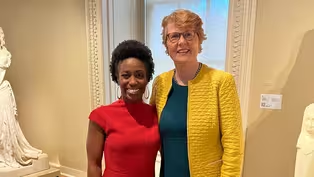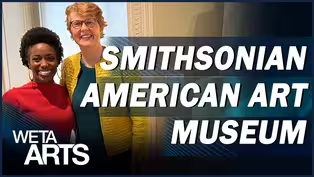
How the United States and Yemen Work Together to Combat Art Crime
Clip: Season 11 Episode 8 | 9m 12sVideo has Closed Captions
Law enforcement officials battle art crime, which has had devastating impacts across the world.
Felicia Curry explores the fascinating world of ancient artifacts and the efforts to preserve cultural heritage in the face of looting and smuggling. Through interviews with experts and law enforcement officials, Curry highlights the extent of art crime across the world and the devastating impact it has on countries like Yemen, which are struggling with civil unrest.
Problems playing video? | Closed Captioning Feedback
Problems playing video? | Closed Captioning Feedback
WETA Arts is a local public television program presented by WETA

How the United States and Yemen Work Together to Combat Art Crime
Clip: Season 11 Episode 8 | 9m 12sVideo has Closed Captions
Felicia Curry explores the fascinating world of ancient artifacts and the efforts to preserve cultural heritage in the face of looting and smuggling. Through interviews with experts and law enforcement officials, Curry highlights the extent of art crime across the world and the devastating impact it has on countries like Yemen, which are struggling with civil unrest.
Problems playing video? | Closed Captioning Feedback
How to Watch WETA Arts
WETA Arts is available to stream on pbs.org and the free PBS App, available on iPhone, Apple TV, Android TV, Android smartphones, Amazon Fire TV, Amazon Fire Tablet, Roku, Samsung Smart TV, and Vizio.
Providing Support for PBS.org
Learn Moreabout PBS online sponsorshipCurry: For many people, ancient artifacts provide a deep connection to the past, but governments have to work hard to protect their country's cultural heritage from wanton destruction and looting, especially in areas of the world struggling with civil unrest.
One such government, the Republic of Yemen, is taking an active role in preserving its priceless antiquities right here in Washington, D.C. Now to a major legal case involving the alleged smuggling of ancient religious artifacts.
We cannot accept that terrorists steal cultural goods.
Individuals are trying to sell objects which appear to have been illegally looted and trafficked.
Curry: An epidemic of crime is plaguing the world of ancient art.
Man: Iraq lost more than 15,000 artifacts.
Many of them are extremely important.
Curry: Around the world, looters are plundering objects from cultural heritage sites.
Man: It's easy to dig in some desert and just take these priceless artifacts to sell them if you have markets.
Man: The United States has a strong law enforcement obligation and interest to bring these objects out of the market.
Man: We work around the clock to pursue those individuals that are behind the looting and theft of these artifacts, and trafficking them.
Curry: Special Agent Robert Mancene works for Homeland Security Investigations, or HSI, in the Cultural Property, Art, and Antiquities Unit.
On my phone, I probably have about 15,000 pictures of artifacts that I'm happy to have been able to return.
There are Greek pieces.
There are Italian pieces.
There are Turkish pieces.
Curry: While investigating a transnational trafficking network, Mancene's team found a New York-based gallery owner who was dealing in stolen goods.
Mancene: Over 1,000 objects of many different origins were seized.
Among those, 64 were from the country of Yemen-- those stone, carved heads.
♪ These steles really tell the rough journey of these objects.
The nose is broken.
Tape was attached to them.
They have blue pigment.
It's modern blue pigment.
They tell very much the story of how careless were the smugglers.
Where's the respect of funerary objects?
♪ It's a region that has hundreds of archeological sites.
How do you protect them?
We also need to consider why all these objects are getting out.
Lenderking: Buyers can be a part of cultural trafficking networks, and that's a particular concern for the United States government, is money that's falling into either criminal syndicates or used for the purposes of carrying out acts of terrorism.
These are things that we have to be on the lookout for.
Curry: Returning an artifact to its country of origin is called repatriation.
Al-Hadhrami: We were approached by the U.S. that, "We have these artifacts we wanted to repatriate to Yemen."
For me, it was a happy news, but then I looked at the situation in Yemen.
Curry: Yemen has been in a state of civil war since 2014.
Al-Hadhrami: Unfortunately, all you hear about Yemen is war, conflict, Iranian-backed militia that are just firing at the Red Sea.
Lenderking: The contemporary significance of Yemen is that it's a strategically located country at the bottom of the Arabian Peninsula.
These are areas through which, say, 15%, 17% of world commerce actually pass, and that's one reason why people have fought over Yemen, I think, for hundreds of years.
Curry: The same geography that intensifies conflict now created untold wealth in antiquity.
From antiquity's perspective, all trade has to go through Yemen, and that made powerful kingdoms and civilizations within Yemen.
Catanzariti: The kingdoms interacted with a lot of cultures from the East and the West.
Yemen becomes a crossroad of culture, artistic traditions, economic exchange, you name it.
Curry: The Smithsonian's National Museum of Asian Art's permanent collection contains Yemeni artifacts unearthed by archeologists whose records, as much as the objects themselves, help scholars piece together what life was like centuries ago.
Catanzariti: It allows us to go to the excavation reports and understand these objects.
We know that the lions come from a residence of a trader.
That allows us to better understand how residences were decorated.
♪ The permanent collection that we have has an archeological context.
The repatriated objects do not have an archeological context, and we are losing that kind of information when it's looted.
Mancene: They're a piece of history.
People feel they need to have them, so maybe it's that.
Maybe it's because they're so beautiful.
Many of the objects that you will see in museums were purchased or donated a long time ago, before law enforcement really began to crack down on the art market.
Curry: And the United States has been cracking down not just on smugglers, but on collectors.
Mancene: Working with the Antiquities Trafficking Unit, we were able to execute some warrants at a home of a private citizen, and we were able to seize dozens of artifacts from many, many different countries, and amongst those were these 3 Yemeni artifacts-- an alabaster ram, an alabaster female figure, and a silver vessel.
The silver vessel, we have no idea where it comes from.
It was probably, our assumption again, owned by elite people, but we don't know that.
Mancene: When you deprive a country of their cultural property, you're hurting countless individuals.
Al-Hadhrami: Although we have other priorities now, at the same time, we cannot ignore that our history has been stolen, and if you don't have history, I don't think you would have a future.
Curry: The solution Ambassador Al-Hadhrami proposed was an historic partnership.
Al-Hadhrami: I looked at the situation in Yemen and talked to my government and to the U.S. and said, "You know, I think it would be better at this stage "for these priceless artifacts to just find good institutions that would house them for safekeeping in the U.S." So the ambassador comes to us and says, "Can you help us look after these pieces?"
and we say, "Yes."
It's allowed us to explore in a new way how we can be the very best partners in their ongoing efforts to preserve their cultural heritage.
Curry: The Smithsonian's National Museum of Asian Art's specialists are collaborating with Yemen's scholars to try to recover the secrets these objects could reveal about what life was like centuries ago.
Robinson: The position our museum has taken is that we're going to document those stories.
Less and less will we be presenting objects as if they'd fallen out of the sky.
We're not just putting these items here just for safekeeping anymore.
We're really starting a partnership with the Smithsonian that would preserve Yemeni heritage, preserve this culture, and put them into context.
Curry: On February 21, 2023, the Embassy of the Republic of Yemen hosted a repatriation ceremony.
Mancene: It was a very joyous occasion.
People were very moved to have their objects back.
Al-Hadhrami: I felt relieved that now we could claim that we brought them back home, even though they're staying here in the U.S. for the moment, but they'll be displayed as a temporary loan from the Republic of Yemen.
That actually gives back these pieces the respect they deserve.
Lenderking: This is really a very important way of the United States helping to connect with these countries culturally, and in the case of Yemen, these artifacts are cultural unifiers in a country that has been enmeshed in civil war for the last 8 years.
♪ I think the broader lesson that I hope we're having some success in transmitting is that habits of collecting need to change.
♪ To see Yemen's repatriated artifacts for yourself, visit the National Museum of Asian Art at 1050 Independence Avenue SW.
It's near the Smithsonian Metro stop, and it's open 10 A.M. to 5:30 P.M. every day of the week.
For more information, go to their website at asia.si.edu.
Preview: S11 Ep8 | 30s | Yemen’s repatriated antiquities; Classical Indian Dance; Smithsonian American Art Museum (30s)
The Smithsonian American Art Museum is Evolving
Video has Closed Captions
Clip: S11 Ep8 | 6m 55s | Smithsonian American Art Museum director shares her vision for the museum's future. (6m 55s)
Step into the World of Bharatanatyam, a Classical Indian Dance Form
Video has Closed Captions
Clip: S11 Ep8 | 9m 3s | A Potomac, MD dance studio teaches Bharatanatyam, a classical Indian dance form. (9m 3s)
Providing Support for PBS.org
Learn Moreabout PBS online sponsorship
- Arts and Music
The Best of the Joy of Painting with Bob Ross
A pop icon, Bob Ross offers soothing words of wisdom as he paints captivating landscapes.













Support for PBS provided by:
WETA Arts is a local public television program presented by WETA



